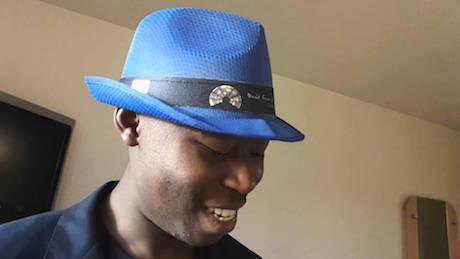

Moses Machipisa.Nicolas Espinoza Tapia speaks to a past youth delegate, who has returned to the Forum to present his work.
Moses Machipisa's project MaYouth Civic Education Initiative uses WhatsApp to build circles of civic training. Nicolas is a member of Project Friends Chile, a pioneering cultural diplomacy project which aims for the development of co-existence and social consciousness, by inculcating Civic Education to children and youngsters through digital media.
Nicolas: What can you tell us about your experience as Youth Delegate to the World Forum for Democracy 2014?
Moses: Basically when I participated in the WFD in 2014 it was a really inspiring moment. It was also a safe space where you could discuss about democracy, issues to do with youth participation in governance. Coming from my background in a country like Zimbabwe where those things are not easy, this small space to discuss initiatives of democracy inspired me very much. And actually it was there, through the themes and influence of the WFD where the ideas of the initiative I’m presenting now came up.
N: After these two days of discussion, debate and analysis of education and its relation with education, what are your main reflections of the WFD2016?
Moses: My reflection is that this event is being really successful in terms of recommendations, some of the challenges that we find in democracy and also the opportunities we have to engage, especially young people. It is a platform to participate. Besides, the networking manages to get in touch with other organisations, and so we can all work together and put our activism into democracy.
N: In your opinion, what are the main challenges that education is facing today and what are those that we will have to face in the following years?
Moses: There are a lot of challenges. From an African perspective the first challenge is the accessibility. A basic education for young people, youth, is facing the problem to the access to education. In the Sub-Saharan Africa the costs of education, higher education is so much that many people cannot pay for it. When it comes to a global perspective, the challenge is that education is not changing fast enough to the current challenges. People are not aware of the concept of global citizenship and teacher training institutions don't develop this concept. There are also other problems like terrorism, extremism, those are the challenges that education is about to address. I think it is about how we adapt education to these challenges. We need education for sustainable development, education for climate change. That is what we must do.
N: We are living in an interdependent world, due to an unprecedented augmentation in the use of informatic technologies and growing influence of social media. In this sense, what are the 'dos and don'ts' that we have to keep in mind when using informatic technologies to educate active cizitens, so they can take informed, strong-based decisions?
Moses: Well, that is very interesting, especially for young people. The first thing is to make the Internet accessible. The second thing is to teach the concept of global citizens. On the other hand, many young people do not realize that the Internet doesn’t forget. There is Cyberbullying, which makes people vulnerable. The Internet has a lot of potential to get young people connected, but as in every other space, there are rights and also responsibilities on Internet. And when people do not understand this, it becomes risky. So, it is about digital citizenship.
N: To what extent do you think young people can really get involved with the political decision-making processes? How can they influence this processes?
Moses: When it comes to democratic and political processes, there are basically two ways in which young people can participate. One is the electorates going to vote and the another one is the people being candidates. But, I think that civic participation is broader than that. In the African context, the most marginalized group of people from the decision-making process is people aged 15 to 35. Not only it is going to vote, but also candidate. Another aspect that young people need to do to actively participate is to take place in policy formulation, where they should be engaged with civil society organisations, youth groups and institutions to shape together their public policies.
N: Finally, what message would you address to those who are losing hope in educational systems and the educational process itself, as our biggest opportunity to improve and democratize our society? Can we be optimistic?
Moses: There is a lot to be optimistic about. Personally from my experience, coming from a very poor country, education enables us to do the things we want to do, as long as we are literate. If you can read it, you can do it. You can take the initiative to educate yourself. For instance, there a lot of massive open online courses you can take. There are even tuition-free universities where you can go. We need to be aware of this environment and aware of the fundamental role that we can play as individuals. Briefly, it is about taking the initiative.
openDemocracy is at this year's World Forum for Democracy, exploring the relationship between education and democracy with a youth newsroom. More here.
Read more
Get our weekly email
Comments
We encourage anyone to comment, please consult the oD commenting guidelines if you have any questions.